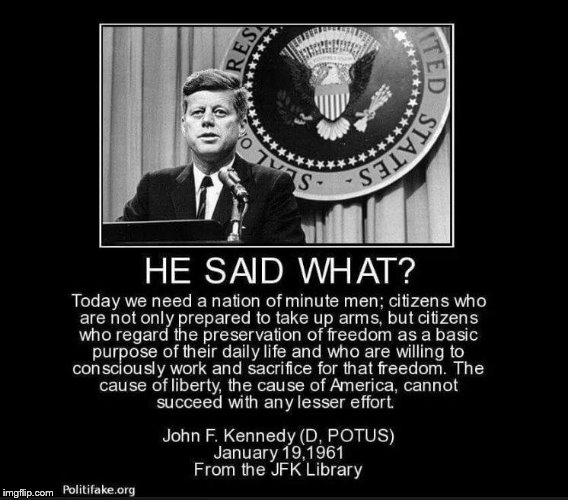SmarterthanYou
rebel
Different subjects??? It goes to the core of what an "absolute right" is. Our disagreement is that we are using differing definitions for the term "absolute". I strive to employ terms as they were understood by the founders / framers
To me, "absolute right" means that NO limit or restriction is justified (or possible) for any reason; this concept goes back to Locke. To me, the only circumstance where one has an absolute right to do anything is when one is living in a state of nature and no semblance of governance is upon him. Under Locke, when one decides to enter into a society, certain aspects of all rights are surrendered to create the social compact. This is evident because even the most exemplary un/inalienable rights (life, liberty, property) are subject to removal by government (imprisonment, death penalty, the taking of private property for public use).
You seem to acknowledge that some limits on the use of guns is justifiable and even legitimate thus you seem to recognize that the right to arms isn't really "absolute". Your use of the term seems to be sophistic and not a true point of argument solidly grounded in the principle of what an "absolute right" is.
Now, this isn't to say that I believe that the federal government possesses any express power to have any interest whatsoever in the personal arms of the private citizen because when it comes down to it, I am a unyielding "conferred powers / retained rights" believer.
That of course is an "original state" situation but in reality I recognize that we have had 227 years of mission creep for the Constitution resulting in the expansion of federal powers, nurtured and cultivated by the Courts.
The tenet that government is restrained by a general liberty concept, that it only can legitimately exercise the powers granted to it, has been lost (or as I agree with you, abdicated by the citizenry).
In a post Slaughterhouse Cases nation (a 1873 SCOTUS decision that gutted the privileges and immunities clause of the 14th Amendment) we must wait to be harmed by government action before we can challenge enacted law (instead of having that general liberty principle binding Congress before it acts). This has reduced us to claiming specific injuries from specific government actions under "due process" so we are stuck with citing the 2nd Amendment as the guarantee of gun rights.
With that comes the baggage of the intent of the Amendment; the "why" framers and the states and the people demanded that the --original, fundamental, pre-existing, not a single aspect of it ever surrendered to government-- right to arms, be held immune from the powers granted to the federal government.
So, Courts have examined the 'object' of the Amendment. That object was primarily to ensure the continuation of the general militia concept so that both the states and he federal government would have a ready pool of properly equipped citizens to call up at a moments notice to aid the civil authority in a time of need.
This is where we get the primary protection sphere of the Amendment. The 2nd Amendment protects the types of arms that are useful to a citizen militia and that can be effectively used by the citizens in the types of engagements that a general, citizen militia are expected to face if called. This "protection" places limits on the right and there is no way to avoid that (without rescinding our consent to be governed).
I do not find the protection sphere established by SCOTUS to be objectionable. Under it, modern military style semi-auto's are protected and a wide swath of existing federal, state and local gun control can and should be invalidated by applying it.
That's where we should be applying our efforts, arguing from and working in the system we have, not arguing concepts that never were and never will be.
The right to arms can not be said to be "absolute" in theory or practice.
the 'social compact' has no mention at all in the constitution or bill of rights, so kindly detail where it says we abrogate our absolute rights by living in society.


